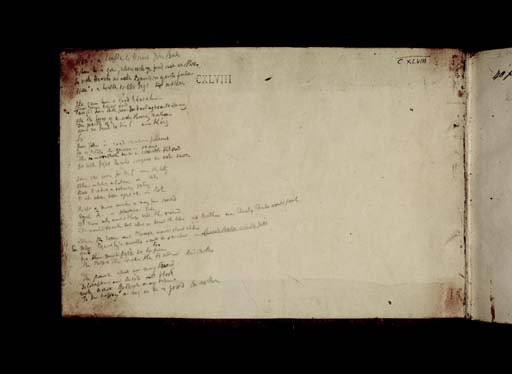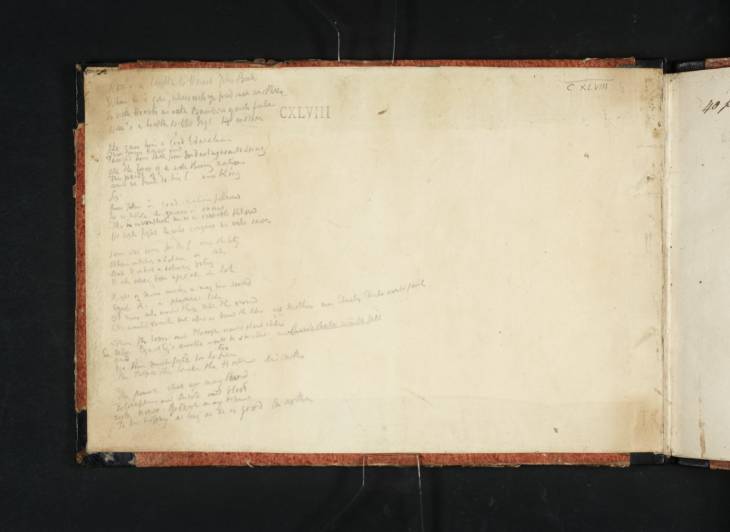Joseph Mallord William Turner Inscription by Turner: Transcript of a Song, 'Here's a Health to Honest John Bull' 1816
Image 1 of 2
-
 Joseph Mallord William Turner, Inscription by Turner: Transcript of a Song, 'Here's a Health to Honest John Bull' 1816 (Inside front cover of sketchbook)Inside front cover of sketchbook
Joseph Mallord William Turner, Inscription by Turner: Transcript of a Song, 'Here's a Health to Honest John Bull' 1816 (Inside front cover of sketchbook)Inside front cover of sketchbook -
 Joseph Mallord William Turner, Inscription by Turner: Transcript of a Song, 'Here's a Health to Honest John Bull' 1816 (Enhanced image)Enhanced image
Joseph Mallord William Turner, Inscription by Turner: Transcript of a Song, 'Here's a Health to Honest John Bull' 1816 (Enhanced image)Enhanced image
Inside front cover of sketchbook
Joseph Mallord William Turner,
Inscription by Turner: Transcript of a Song, 'Here's a Health to Honest John Bull'
1816
(Inside front cover of sketchbook)
Joseph Mallord William Turner 1775–1851
Inside Front Cover:
Inscription by Turner: Transcript of a Song, ‘Here’s a Health to Honest John Bull’ 1816
D40860
Pencil on white wove paper, 173 x 260 mm
Inscribed by Turner in pencil ‘Here’s a health to Honest John Bull...’ (see main catalogue entry)
Inscribed by an unknown hand in pencil ‘CXLVIII’ top right
Stamped in black ‘CXLVIII’
Inscribed by Turner in pencil ‘Here’s a health to Honest John Bull...’ (see main catalogue entry)
Inscribed by an unknown hand in pencil ‘CXLVIII’ top right
Stamped in black ‘CXLVIII’
Accepted by the nation as part of the Turner Bequest 1856
References
1909
A.J. Finberg, A Complete Inventory of the Drawings of the Turner Bequest, London 1909, vol.I, p.426 as ‘...rough copy in pencil of a song about “John Bull”’.
1975
Jack Lindsay, ‘Turner and Music: Part I’, Turner Society Journal, no.2, October 1975, p.15.
1984
David Hill, In Turner’s Footsteps: Through the Hills and Dales of Northern England, London 1984, pp.31, 102, 127.
Turner’s transcript of the song reads as follows:
Here’s a health to Honest John Bull
When he is gone where will ye find such another
So with Hearts as with Bumpers quite fill
Here’s a health to Old Engl[and] his mother
When he is gone where will ye find such another
So with Hearts as with Bumpers quite fill
Here’s a health to Old Engl[and] his mother
She gave him a good Education
[^] That from Honor and
Taught him that from Industry would spring
All the honor of a well thriving nation
[^] The pride of
And be true to his C[ountry] and King
[^] That from Honor and
Taught him that from Industry would spring
All the honor of a well thriving nation
[^] The pride of
And be true to his C[ountry] and King
[^] So
Now John is [a] good natured fellow
He is noble he [is] generous and brave
Tho in in conflict he is a redoubtable fellow
He will fight he will conquer he will save.
Now John is [a] good natured fellow
He is noble he [is] generous and brave
Tho in in conflict he is a redoubtable fellow
He will fight he will conquer he will save.
Some are born for the C[ountry] some the City
Others inhabit a Palace or [a] cot
But O what a dolorous ditty
If all were born equal in Lot
Others inhabit a Palace or [a] cot
But O what a dolorous ditty
If all were born equal in Lot
Right of Man makes a very fair sound
Equal R[iches] a plausible tale
Of those who would then till the ground
All would drink but who brew the Ale
[^] And [?Charley Chalon] would fail
His mother
Equal R[iches] a plausible tale
Of those who would then till the ground
All would drink but who brew the Ale
[^] And [?Charley Chalon] would fail
His mother
Then the loom and Plough would stand still
Een where Equality’s mantle would be small
[^] And [?Charley Chalon] would fall
[^] And
We then must fight for to fill
The Pulpit the [?...] the Hall
His mother
Een where Equality’s mantle would be small
[^] And [?Charley Chalon] would fall
[^] And
We then must fight for to fill
The Pulpit the [?...] the Hall
His mother
The [?power] what we may [?Stand]
The corruption and Riot and blood
With Honor [?...] may depend
To be happy as long as he is good
His mother
The corruption and Riot and blood
With Honor [?...] may depend
To be happy as long as he is good
His mother
These verses are a variation of a song ‘Here’s a health to right Honest John Bull’ first published in the early 1790s. An early edition was credited to the pseudonymous Earl of Howard and a longer version, attributed to an anonymous ‘well-wisher to King and Country’,1 appeared with other ‘Select Modern Poetry’ in The Gentleman’s Magazine, February 1805 (p.158); it was to be sung to the tune ‘Why Moses, why Aaron’ and with a chorus, ‘Here’s health to right honest John Bull’ after each verse. This might in turn be associated with the 1803 play John Bull by George Colman the younger, or with lines sometimes attributed to the poet William Cowper but not acknowledged by him.
The version published in 1805 had thirteen verses as opposed to the seven written out here by Turner. This is not the first time that Turner had given the song his consideration. An earlier transcription of eleven verses, headed ‘John Bull Content’, in the 1808 Derbyshire sketchbook (Tate D07145–D07147; Turner Bequest CVI 11–12) may not be in Turner’s own handwriting but at least demonstrates his interest. Of the two versions in his sketchbooks, the present one goes further in changing the usual meaning of the song.
It is not evident in what circumstances Turner wrote it, although it certainly seems intended for repetition. The present writer has suggested that the artist might have regaled his friends at Farnley Hall with it at the end of his 1816 tour of Yorkshire and the North of England documented in the rest of this sketchbook, having perhaps heard it sung in an inn somewhere along his route. That may be so, but the alternative lines and elisions in the transcript suggest a creative involvement with the sense and phrasing. The departures from the original are numerous and considerably alter the sense and general tenor. The original is an unashamedly anti-reformist Tory paean to the established order, the rights and privileges of property, and instruction to the honest Englishman to happily accept his lot, place and duty. Turner’s version adapts the original form of words, sometimes quite radically, and in places appears to twist the politics into something more levelling in its sympathies.
Certainly stanzas in the original that breezily celebrate the necessity (for example) of there being fine Lords and Ladies and the munificent rule of the King and judiciary, or warn against the chaos that would ensue in the absence of the ruling classes, the wretchedness that would accompany egalitarianism, or the incipient relation of roguery with radicalism, are all dropped. It is perhaps unfortunate that Turner’s handwriting is not easier to decipher, or his literary skills greater. Nevertheless, it would appear as if the Tory sympathies of the original were being countered to a degree that might have appealed to the Whig gentry who gathered around Walter Fawkes2 at Farnley.
David Hill
May 2009
Revised by David Blayney Brown
April 2013
Known also from copies at the British Library, London, and elsewhere and also published in the London Chronicle in 1796.
How to cite
David Hill, ‘Inscription by Turner: Transcript of a Song, ‘Here’s a Health to Honest John Bull’ 1816 by Joseph Mallord William Turner’, catalogue entry, May 2009, revised by David Blayney Brown, April 2013, in David Blayney Brown (ed.), J.M.W. Turner: Sketchbooks, Drawings and Watercolours, Tate Research Publication, December 2013, https://www

